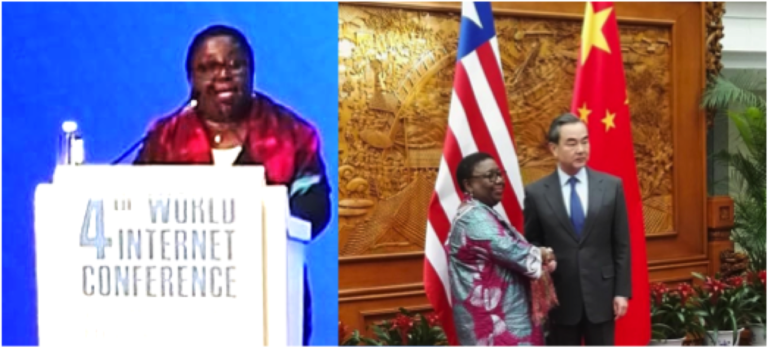Press Release
Liberia has joined other nations in calling for a free, open and safe cyberspace that will allow digital trade and other activities which enhances sustainable economic development and growth.
“The development of cyberspace continues to have phenomenal impact on virtually every aspect of our human life. In fact, cyberspace now is a major contributor to the GDP of many countries around the world. Internet remains one of the major catalysts for economic growth and development and provides greater opportunity for delivering education, healthcare and environmental service,” Foreign Minister Marjon Kamara said.
She stressed that cyberspace makes governments more effective and responsive to citizens needs and enables free exchanges of data and information. “Areas like big data analytics, artificial intelligence, robotics, and cloud computing are bringing significant changes in the global economy. As such, the need for openness, safety and digital literacy cannot be overemphasized,” she indicated.
According to a Foreign Ministry release, Foreign Minister Kamara made the assertion when she delivered a statement on behalf of the Liberian Government at the 4th World Internet Conference (Wuzhen Summit), co-hosted by the Cyberspace Administration of China and the People’s Government of Zhejiang Province, held in Wuzhen, Zhejiang Province, China from December 3rd to 5th, 2017.
Under the theme: “Developing Digital Economy for Openness and Shared Benefits – Building a Community of Common Future in Cyberspace,” this year’s conference further facilitated discussion and dialogue on digital economy, cutting-edge technologies, internet and society, cyberspace governance, and exchanges and cooperation.
The Conference provided the platform for building a community of common future in cyberspace, promoting worldwide respect for diversity, focusing on mutual development, forging consensus and boosting innovation.
Foreign Minister Kamara informed the audience that while enjoying several years of peace and stability, Liberia has made strides in gaining a footprint in cyberspace. “Currently, Liberia is ranked 73rd in the world internet access and 24th on the continent of Africa,” she noted; adding that although Liberia cannot boast of major and advanced achievements in modern technology such as big data analytics, artificial intelligence, robotics, among others, it has been able to join the digital world by first connecting to the Africa coast to Europe optical fiber system for high speed internet access.
She furthered that Liberia has also created the legal, regulatory and enabling environment thereby leaving its footprint in cyberspace. “As a nation, we have been working diligently to provide the much-needed infrastructure and human capacity to engage and leverage modern technologies for sustainable economic growth,” Minister Kamara said.
However, she indicated that the lack of resources including finances and human capacity to achieve this goal remains Liberia’s major challenge. “Despite the progress made, we are still unable to provide countrywide coverage to our population due to poor infrastructure and economic constraints.”
Foreign Minister Kamara stressed that Liberia has the potential to leverage cyberspace to achieve sustainable economic growth, considering its youthful population and the demand for cyberspace education; however, it will need to partner with countries such as China, which is one of the world’s major contributors to and user of modern technological breakthroughs, and which has vast human capacity.
“With the required resources and opportunities, developing countries would be well placed to pursue economic transformation towards the twin objectives of poverty reduction and achievement of a middle-income status,” she said.
Speaking further, Foreign Minister Kamara said less than half of the world’s population is benefiting from cyberspace and developing countries suffer due to the persistent digital divide. She said over 75 percent of the African population lacks internet access which further constrains the poor from accessing economic opportunities; noting that though access to telecommunication has increased internet penetration in many African countries, there remain the bigger challenges of affordability and readiness.
She commended China for its innovation in the areas of technology and cyberspace, and for its willingness to share knowledge. She encouraged the Chinese private sector to explore opportunities under the Forum on China-Africa Cooperation (FOCAC) and the One-belt One Road initiatives to invest in ICT infrastructure in developing countries particularly sub-Sahara Africa.
Foreign Minister Kamara was accompanied to the Wuzhen Summit by the Deputy Minister of International Cooperation and Economic Integration, Mr. Dehpue Zuo and the Managing Director of LIBTELCO, Mr. Darren Wilkins.
Meanwhile, Foreign Minister Kamara paid a courtesy call on the Chinese Foreign Minister, His Excellency Wang Yi at his foreign ministry office in Beijing, China. Both Foreign Ministers had the opportunity to discuss a wide range of topics, including bilateral issues affecting Liberia – China relations.

